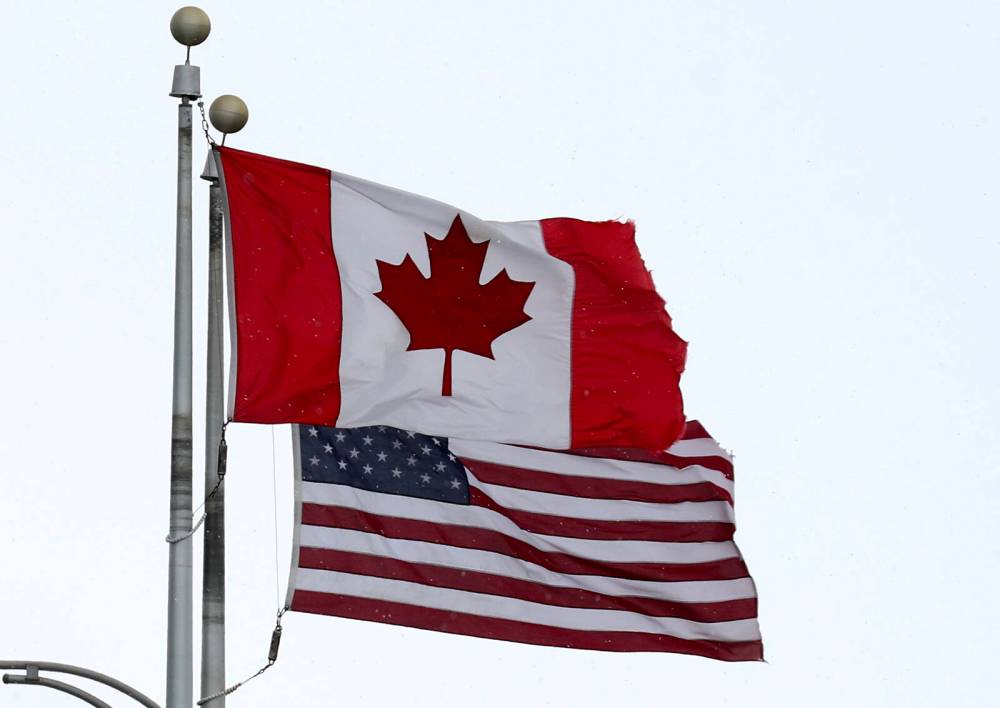Travel to the United States ‘goes south’
Advertisement
Read this article for free:
or
Already have an account? Log in here »
To continue reading, please subscribe:
Monthly Digital Subscription
$1 per week for 24 weeks*
- Enjoy unlimited reading on winnipegfreepress.com
- Read the E-Edition, our digital replica newspaper
- Access News Break, our award-winning app
- Play interactive puzzles
*Billed as $4 plus GST every four weeks. Offer only available to new and qualified returning subscribers. Cancel any time.
To continue reading, please subscribe:
Add Winnipeg Free Press access to your Brandon Sun subscription for only
$1 for the first 4 weeks*
*$1 will be added to your next bill. After your 4 weeks access is complete your rate will increase by $0.00 a X percent off the regular rate.
Read unlimited articles for free today:
or
Already have an account? Log in here »
In conversational Prairie parlance, the phrase “gone south” can have a couple of different meanings.
Taken literally, it most often refers to travels south of the border, in search of warmer climes during winter months or perhaps in pursuit of more proximate recreational or shopping opportunities in the U.S. states geographically adjacent to our province.
A more metaphorical application of “gone south” can refer to a relationship that has soured or an activity or attitude that has taken a turn toward the negative.

joe raedle / getty images FILE
A Canadian flag flies next to the American one at the Lewiston-Queenston border crossing bridge connecting Ontario and New York.
A Canadian flag flies next to the American one at the Lewiston-Queenston border crossing bridge on Feb. 4, 2025, in Niagara Falls, Canada. (Joe Raedle/Getty Images/TNS)
In the context of current Canada-U.S. relations, one might fairly argue the literal definition of the phrase has veered sharply into its metaphorical sense. In other words, for many Canadians, the notion of going south has gone south, owing to a combination of factors but largely as a direct result of the tariffs, tirades and travel irritations unleashed by U.S. President Donald Trump.
Since taking office in January, Trump has embarked on a trade/tariff war with pretty much all of America’s formerly friendly global partners, including Canada; has frequently and openly mused about annexing this country — against its will, if necessary — as the 51st U.S. state; and has imposed “border security” measures that will make it more difficult for Canada’s snowbird class to spend extended periods in southern sun-belt destinations such as Florida, Texas, Arizona and California.
Combined with an onerously unfavourable currency exchange rate that has made spending time and money in the U.S. much more expensive, the accumulated weight of Trump-administration impositions and insults has prompted many Canadians to rethink their plans for U.S.-bound travel.
According to U.S. border data, automobile traffic through the Emerson/Pembina land crossing during the first two months of this year declined 17 per cent over 2024 figures. With the full impact of Trump’s provocations only beginning to be felt, it’s expected that cross-border car traffic will continue to decline.
Meanwhile, the travel-industry monitor group OAG Aviation Worldwide estimates U.S.-bound airline bookings by Canadians have declined by more than 70 per cent for the upcoming summer months. And the Travel Health Insurance Association of Canada says 61 per cent of Canadians surveyed have made travel plans this year, but 70 per cent of them said those plans are unlikely to include a visit to the U.S.
Delta Airlines pulled back its 2025 forecast on Wednesday, citing declining air travel numbers into the U.S.
Those figures are daunting for the portion of the American economy that depends of tourism: according to the U.S. Travel Association, just a 10 per cent reduction in Canadian visits to that country would mean US$2.1 billion in lost tourism revenue and as many as 14,000 lost jobs.
Sadly, it all falls into the category of “unintended consequences” of a wave of policy changes invoked through executive order rather than legislative deliberation, by a president whose actions are neither reasonable nor rational. They are part of an antagonistic, isolationist agenda that seems based in some whimsical desire on Trump’s part to return the U.S. to a sepia-toned “gilded age” in which manufacturing was strictly a domestic endeavour, global trade was an afterthought and America’s ruling class was unfettered by laws and regulations that might impede its ability to amass wealth.
Trump has gone out of his way to make the rest of the world — save for the occasional despot whose approval he openly courts — feel unwanted and unwelcome in his land. And Canadians, who for so long have been America’s next-door neighbours, trusted friends and frequent economy-boosting visitors, have clearly taken the hint.
Going south has, in no uncertain terms and for very good reasons, gone south.







